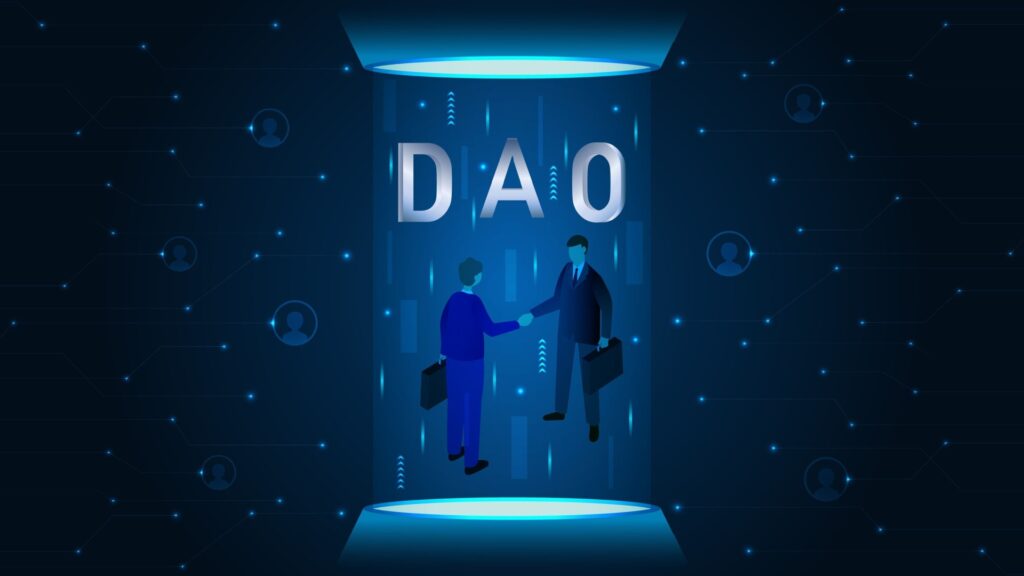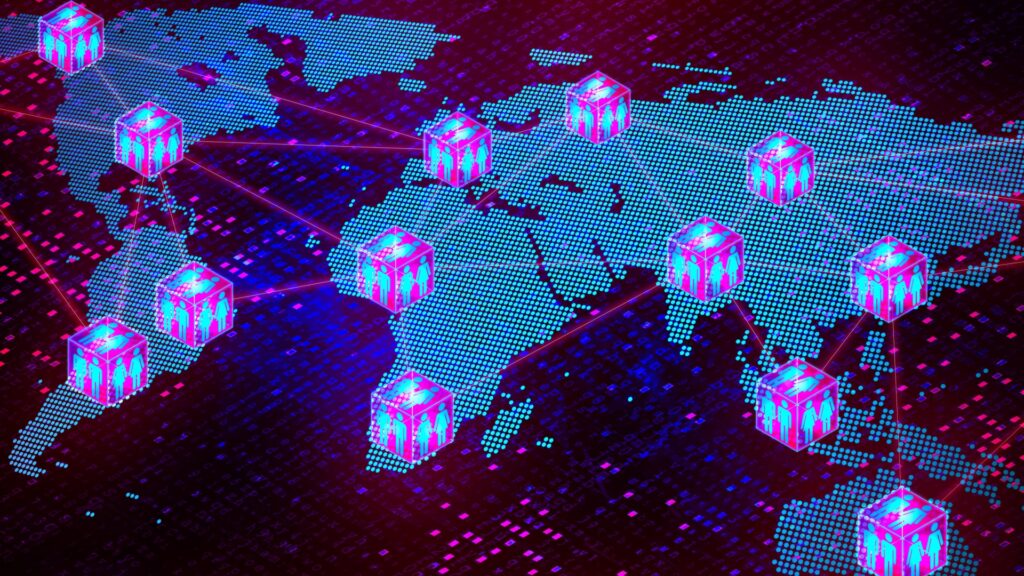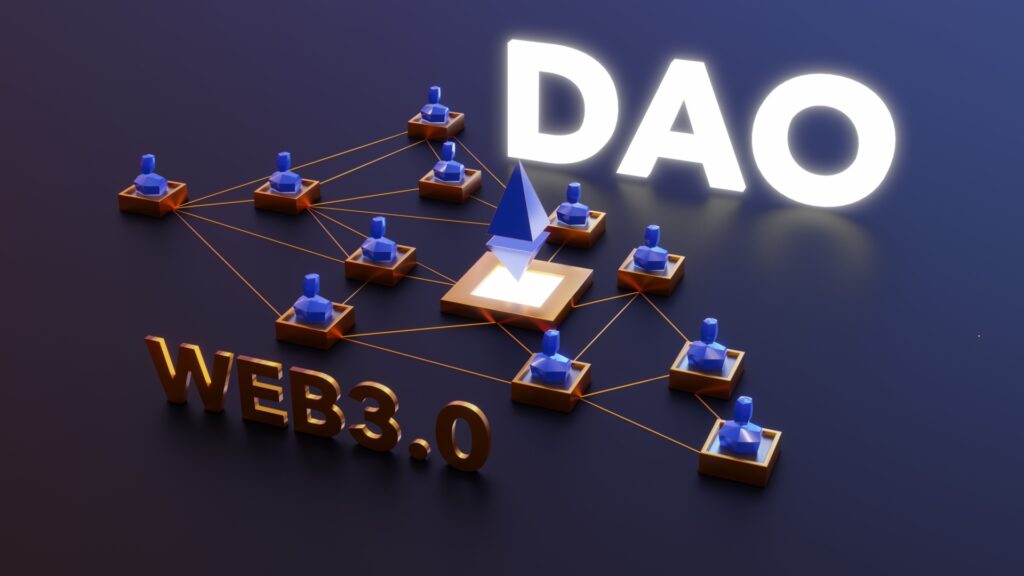In recent years, the world of business and technology has been undergoing a true revolution thanks to the concept of decentralized autonomous organizations (DAOs). These innovative structures, built on blockchain technology, offer new approaches to management that differ significantly from traditional corporate models. This article explores what DAOs are, how they function, and how they impact modern business models.
What is DAOs?
Decentralized autonomous organizations (DAOs) are digital organizations governed by smart contracts on the blockchain. These organizations operate without centralized leadership or hierarchy, allowing participants to make decisions based on consensus. DAO members can be individuals or legal entities, and their influence on management is determined by the number of tokens they hold. This model makes organizations more transparent and democratic, with all actions recorded on the blockchain, ensuring a high level of trust among participants.
How Do DAOs Work?
DAOs are managed through smart contracts—programmed codes that automatically execute agreements between participants. Members can submit proposals for changes, vote on them, and implement them once a certain voting threshold is reached. This process makes decision-making more transparent and democratic. Additionally, due to their decentralized nature, DAOs are less vulnerable to manipulation and corruption, a common risk in traditional business models.
A critical aspect of DAO functionality is the voting process. When a participant proposes a change or initiative, the entire community can vote for or against it. Depending on the established rules, a certain percentage of votes may be required for the decision to pass. This democratic process allows all participants to influence the DAO's development and fosters a high level of engagement.
DAOs manage their funds through decentralized finance (DeFi) mechanisms. This means the organization can store, invest, and allocate funds without relying on traditional financial institutions. For example, DAOs can use their funds to finance projects, distribute dividends among members, or support new initiatives. All financial operations are also recorded on the blockchain, ensuring transparency and accountability.
The Impact of DAOs on Business Models

Transition from Centralized to Decentralized Management
Traditional companies often operate with a rigid hierarchical structure, where decisions are made by top management. This approach can lead to slow decision-making, inefficiency, and a lack of employee engagement. In contrast, DAOs offer a decentralized management model where all participants have a voice and can propose changes. This fosters a more democratic environment where every team member feels valued and actively involved in the process.
Increased Transparency and Trust
By using smart contracts and blockchain technology to manage operations, participants can clearly see how decisions are made and track task execution. This significantly reduces the risk of fraud and corruption, while building trust among participants. For startups in their early stages, such transparency can become a major competitive advantage, attracting both investors and customers.
Flexibility and Adaptability
DAOs enable companies and startups to quickly adapt to market changes. In today’s fast-paced and uncertain business environment, the ability to swiftly adjust strategies and approaches is critically important. Within a DAO, any participant can propose changes and improvements, allowing the organization to rapidly respond to new challenges and opportunities. This creates a culture of innovation, where every voice matters and new ideas can be implemented without lengthy approval processes.
Additionally, DAOs are not limited by geographical boundaries. This means companies can attract talents from around the world, building international teams capable of collaborating on projects in real time. This approach not only expands the pool of potential employees but also brings a diversity of ideas and solutions, fostering a more creative and efficient workflow.
Challenges and Issues

Despite numerous advantages, DAOs face several challenges. One major issue is regulation, as many countries have yet to establish clear legal frameworks for decentralized organizations. Additionally, protection against attacks and vulnerabilities in smart contracts requires thorough analysis and testing.
For example, The DAO has been one of the most significant and widely discussed projects in cryptocurrency and blockchain history. Launched in 2016, The DAO was one of the first attempts to create a decentralized venture capital fund managed by the community and built on smart contracts. However, despite its ambitious goals, the project encountered serious issues that led to its collapse.
The DAO was launched on the Ethereum platform to raise investments for funding startups and innovative projects. It promised investors the opportunity to earn dividends from selected projects and participate in decision-making regarding fund distribution. During its initial coin offering (ICO), The DAO raised a record-breaking $150 million, making it the largest ICO at the time.
Unfortunately, in May 2016, less than a month after its launch, The DAO became the victim of a hacker attack. The attacker exploited a vulnerability in the smart contract to withdraw over $50 million worth of Ether, approximately 30% of the total funds raised. This attack caused massive disruption within the Ethereum community and severely threatened trust in decentralized systems. In response, the Ethereum community decided to implement a hard fork. This move created a new version of the Ethereum blockchain (ETH) that restored the lost assets to investors. However, this decision sparked significant debate about whether intervention in a decentralized system was appropriate. Ultimately, the hard fork split the community into two groups: Ethereum and Ethereum Classic, with the latter continuing on the original, unaltered blockchain.
The story of The DAO became a critical lesson for the entire crypto community. First, it emphasized the need for comprehensive smart contract audits and security measures. Second, it highlighted how rapid decision-making and intervention can impact the decentralized nature of the blockchain. Finally, The DAO highlighted the importance of transparency and trust in community-driven systems. Despite its failure, The DAO opened new possibilities for decentralized autonomous organizations and laid the groundwork for further experimentation in this field. The lessons learned from this case remain relevant today, helping shape safer and more reliable models of decentralized governance.
Examples of Modern DAO Projects

MakerDAO is one of the first and most well-known DAOs in the Ethereum ecosystem, managing the stablecoin DAI. MakerDAO allows users to lock cryptocurrency into smart contracts to generate DAI, ensuring its stability relative to the US dollar. Participants vote on protocol changes, such as interest rate updates and collateral parameters. This system enables the community to control and manage the stablecoin while maintaining decentralization and transparency.
Compound is a decentralized lending and borrowing protocol. It operates as a DAO, where users can supply their assets for lending or borrow assets with collateral. Decisions about new tokens and protocol changes are made through participant voting, with users holding COMP tokens. Every time users interact with the platform, they earn tokens that can be used for voting, creating an incentive for active participation in governance.
Aave is another popular decentralized lending protocol that also functions as a DAO. Participants can deposit their crypto assets into a liquidity pool and earn interest on their contributions. Aave uses AAVE tokens for platform governance, allowing holders to vote on changes, improvements, and new features. This gives the community the ability to influence the platform's future and actively contribute to its development.
These DAO projects demonstrate how decentralized autonomous organizations can transform management and interaction in the cryptocurrency world. With each new DAO example, we see how this concept continues to evolve and open new horizons for communities and entrepreneurs in the decentralized economy.
DAOs represent a new stage in business management development, offering a more democratic, transparent, and flexible approach that meets the demands of the modern world. However, despite their advantages, DAOs also face challenges such as regulation, security, and the need for ongoing technological advancement. Nevertheless, their potential to transform business and create a fairer and more democratic economy is undeniable. In the future, we can expect DAOs to become an essential part of the corporate landscape, opening up new opportunities for entrepreneurs and investors.